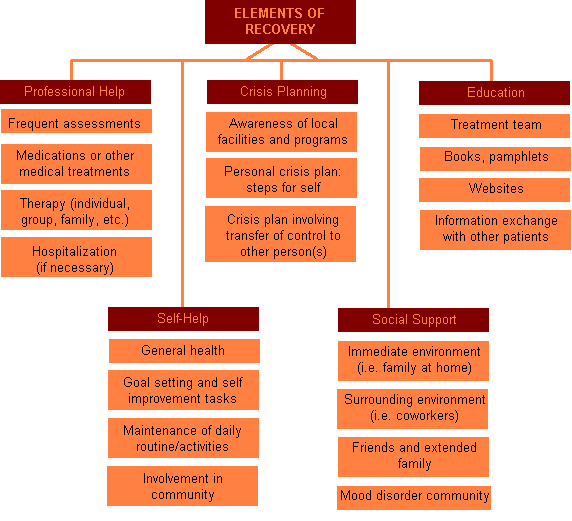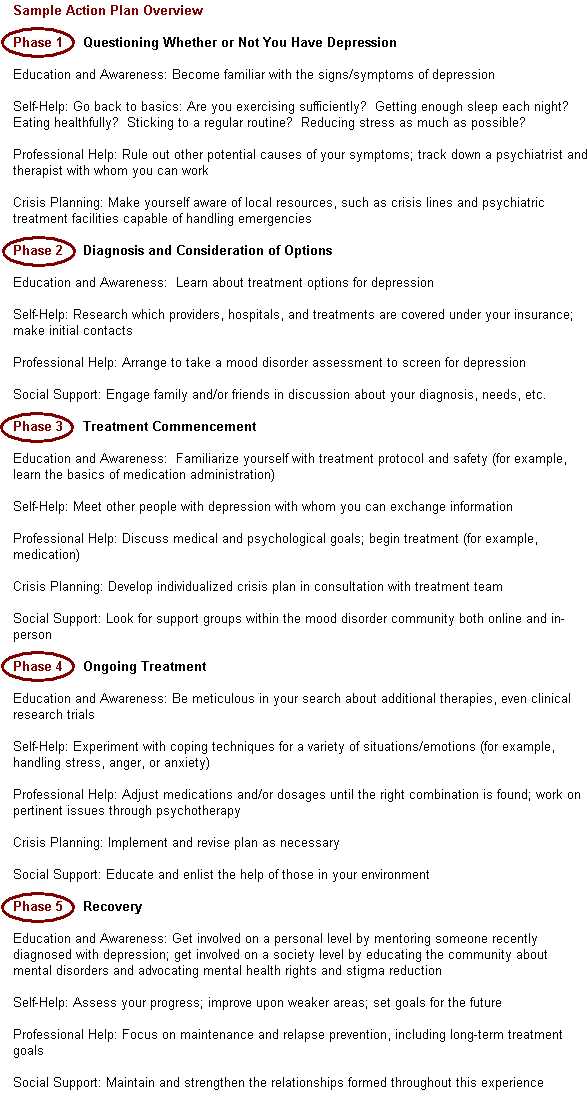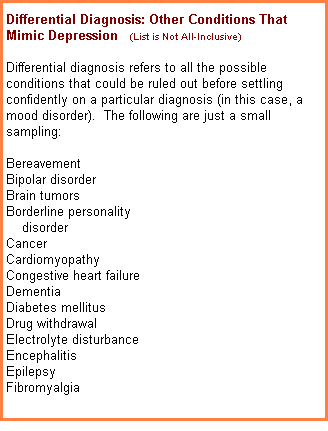The
5 Stages of Grief: Where do you fit in?
Previously referred to
as the "5 Stages of Receiving Catastrophic News," this progression
refers to the common evolution of the emotional response upon receiving
news of one's diagnosis. Comparable to mourning the loss of
a loved one, this "mourning" process deals with the loss of what once was--before
depression came knocking on the door. Acknowledging that this
is a natural chain of events and going with the flow, dealing
as best as we can at each stage, can be both comforting and beneficial.
Which stage best describes you at the moment?
Denial
Despite the fact that it can be quite a relief to finally
attach a name to what has been ailing us, the realization that this
is a long-term battle can be frightening. Mental illness is
what happens to "other people," so it can be easy to deny that the
category now includes ourselves--especially since we can be possessive
of our thoughts and emotions, and the idea that they are driven by
something not entirely in our control can be unsettling.
What
you might notice: hesitation to visit the psychiatrist again,
refusal or reluctancy to take medications prescribed, attemps to "prove"
that the mental illness label does not apply to you, attempts to dissociate,
or detach oneself, by a variety of means (this can include such maladaptive
behaviors as drinking, self-injury, etc.)
Anger
So, you
have mental illness (and are acknowledging it now). Life gave
you a raw deal, and you're mad at the world for this injustice.
You never did anything to deserve this form of torture, and you want
to set out on a path of destruction.
What you might
notice: feeling like you're going to explode or implode, the
littlest thing ticks you off, arguments with others are more frequent
now, there are possibly some violent behaviors in the mix, as well
Bargaining
and Guilt
You are now beginning to realize that you cannot escape
the truth or the inevitable. This is an awakening--you realize
the symptoms and implications of the illness were there (sometimes
long) before the official diagnosis, and you begin to feel guilty about how
this might have impacted others' lives. You feel guilty
for "letting it happen," for having the illness--even though it was
out of your hands
What you might notice: placing blame
on your past actions--what you did or did not do, feeling guilty about
present restrictions, interpersonal relationships gone bad, begging,
wishing, praying, making deals with a higher power
Depression
With
the courage to accept that what is happening to you is reality comes
a situational depression. Life will never be the same.
I will never be the same. This is how it is now. Since,
ironically, the underlying illness involves depression itself,
it can be difficult at times to separate the situational depression
(the stage of recovery) with the physiological depression.
What
you might notice: symptoms of depression including hopelessness,
helplessness, tearfulness, isolation, fatigue, loss of interest
in things, suicidality
Reconciliation
Finally, you
have come to terms with your situation and are accepting your illness
as well as the treatments that may be necessary to assist you
in living a healthy, satisfying life.
What you might notice:
a questioning of where the disorder ends versus where your personality
begins, a sense of peacefulness and hope regarding the present and
future, an appreciation for the enlightenment and personal discovery
process that has been taking place since your diagnosis
References
"5
Stages of Bipolar Grief"
http://members.iinet.net.au/~fractal1/fsrvive1.htm
"Differential
Diagnosis of Major Depression"
The Cleveland Clinic
Foundation, 2002
www.clevelandclinicmeded.com
"Major
Depression Differential Diagnosis"
www.fpnotebook.com
How
to Help Someone With Depression
While this is fairly dependent
upon the individual's personality and comfort level with the diagnosis, there
are some tips mentioned below that apply to many situations. If
in doubt, initiate a discussion with the person regarding things
you can do to best support them throughout their battle with depression;
if they do not seem receptive to the idea of open communication,
do your best to determine how to cater to their needs based on
trial and error.
Educate Yourself
There are many misconceptions
about mental illness (that the individual did something to cause it,
that it's simply an excuse for laziness and/or attention, that
the person should be able to just "snap out of it," etc.).
Familiarizing yourself with the physiological and psychological basis
and treatments of depression will help you gain a better understanding
of the reasons behind the person's thoughts and behaviors.
Temporarily
Take on Additional Responsibilities
While establishment of a
daily routine and continuation of life-sustaining activities are important
in depression recovery, there may be times when the depressive individual
needs a break from responsibility. Simply getting out of bed
may seem overwhelming. It is during these times when you might
consider assuming additional responsibilities that permit the person
to concentrate on recovery--without the unnecessary stress.
This may include things like preparing meals for them, doing their
laundry, etc.
Assist With Treatment Related Issues (if requested)
If
the person is willing to receive your help in this regard, there is
so much you can do to help them make progress in their treament: schedule
appointments, drive them to and from the office, sit in with them
and take notes during appointments, research treatments for them,
pick up their prescriptions, remind them to take their medications,
suicide-proof the house, hang on to a copy of their crisis plan, etc.
Avoid
Minimizing the Pain You Can't See
Most of us can relate to the
pain of a bad bump or bruise, never questioning whether or not the
pain actually exists when the bruise is evident to the naked
eye. Depression is a form of psychological pain (that can be
experienced viscerally, as well), which makes it harder to explain.
If you haven't experienced it yourself, it is impossible to understand
the depths of pain and despair one can get trapped in during a
depressive episode. It's important to remember that, just because
you cannot see it or relate to it fully, it does not mean the pain
does not exist for this person. The brain is an organ, too.
Respect
Limitations
Encourage them to get out of the house, participate
in events, socialize, etc., however be careful about pushing too hard.
If the person says he or she needs space and time alone to reflect,
try to respect that. Some people might actually be delighted
to have someone to talk to about their disorder, whereas others might
wish to talk about anything but. Also, be careful not to check
in with the person's emotional state too often; just as you wouldn't
ask someone with a broken leg "Are you feeling any better yet?"
every 15 minutes, recovery from depression does not happen overnight.
Share
Ideas and Experiences With Others
Information exchange is always
a great way to discuss the effective techniques (and the
not-so-effective) and add to your repetoire of coping mechanisms.
In addition, the social support from others dealing with mental illness
in the family can be reassuring, motivating, and even inspiring.
Take
Care of Yourself
Life with a depressive individual can be stressful
at times. Although a lot of your time and effort may go into
supporting this individual, if you don't look out for your own health
as well, you will be of no use to anyone. Don't be afraid to
say, "I'm sorry. I can't help you with this today, but let's
find you someone who can." Taking care of yourself will permit
you to take care of your loved one in the long run.
Okay, so you were diagnosed with a
mood disorder. Now what?
Familiarizing yourself with the
territory and setting appropriate short-term and long-term goals
will help you organize your thoughts. Although there are
many professionals who can guide you through treatment, YOU
are the one ultimately responsible for your recovery. It is
your job to point out concerns, ask questions, assess your own progress,
and report back to your treatment team. The professionals will
help you keep the ball rolling; however, you are at the center of
your treatment team. Establishing your role as an active member
of the team starts with a plan for your recovery. The following
two sections in particular are meant to provide an example of
such a plan of attack; the remaining sections touch upon topics
pertaining to overall treatment (differential diagnosis, stages of
coping with difficult news, and how to help someone who has depression).
Focus on Bipolar Disorder
Bipolar disorder
is characterized by moods cycling between depression and "mania".
It is not uncommon for people with bipolar disorder to first be misdiagnosed
as having a depressive disorder. This is, in part, because most people
go in to see the doctor during the depressive stage, so the other
side of the spectrum is not apparent to the physician.
The following are some symptoms of mania:
-
excessively "high" mood
- increased energy
- racing thoughts
- little need for sleep
- irritability, distractibility
- poor judgment
-
increased sex drive
- spending sprees
- unrealistic beliefs in one's
abilities
and powers
If you think you fit this description, mention it to your
doctor so he or she can best treat your condition.






